During the season of Advent, many of our appointed texts focus on John the Baptist: How he prepared the way for the first coming of Christ, and how the baptism of John differed from the baptism of Jesus.
For example, in the
Gospel reading for the fourth Sunday of Advent, John 1:19-28, the
Pharisees ask John, “Then why are you baptizing, if you are neither
the Christ, nor Elijah, nor the Prophet?” John answered them, “I
baptize with water, but among you stands one you do not know, even
he who comes after me, the strap of whose sandal I am not worthy to
untie.”
John already had
quoted the prophet Isaiah in response to the Pharisees' demand to
know who he was. “A voice cries in the wilderness, prepare the way
of the Lord; make straight in the desert a highway for our God.”
(Isaiah 40:3). By calling the people of Israel to repentance and a
ritual bath as a sign of repentance, John prepared the way for
Israel's promised Messiah, the Savior of the world. Through the water
of baptism he confirmed and sealed his preaching unto repentance. He
admonished the people of Israel that they were in need of a cleansing
from sins. Those that were baptized by John confessed their sins.
But still the
baptism of John only pointed forward to the fulfillment of the
redemption in Christ. And the Messiah was even then in the world, He
was living in the midst of the Jewish people, though as yet unknown
to them. John was the last and greatest prophet of the old covenant,
preaching the Law so that it might touch the people's hearts and
convince them of their need for a Savior. The Law still serves to
convict us of our sin, but in Christian baptism, we have the Gospel,
the good news of salvation in Jesus, made tangible for us in the
water and the Word. Because Christ died in our place on the cross and
rose again on the third day, baptism is death to sin and the
beginning of new life (Romans 6:3-5). Jesus' death and resurrection
were made possible by His birth, so Christmas is a celebration of His
birth, yet also a celebration of our new birth.
We began the new
year by remembering the holy Child's circumcision and naming. According to the Jewish law, male babies were
circumcised on the eighth day of their birth to signify that through
them the seed of Abraham would continue until the birth of one
particular descendant of Abraham, the Messiah. By being circumsized
Himself, the Messiah fulfilled all the law of Moses in our place,
then by being baptized Himself by John, Jesus assured all who believe
in Him that baptism with water seals them as part of His people. Not
by circumcision of the male line, but by the direct spiritual
regeneration of all who receive the sacrament, regardless of
racial/ethnic background, sex or social class (Gálatas 3:23-29).
So it is fitting
that in 2017, the 500th anniversary of the renewal of the church, the
culmination of the Christmas and Epiphany seasons will be the
dedication of our new chapel on January 8, the Sunday on which we
celebrate the baptism of Jesus. Three children will be baptized that
day and five young people take take their first communion. May God
grant that the work of the Holy Spirit continue in the lives of
these, His children, throughout this new year and for all the days to
come. Amen.


No comments:
Post a Comment